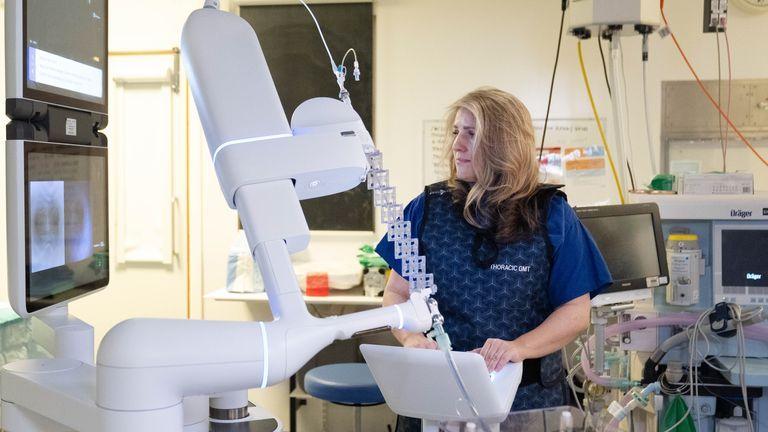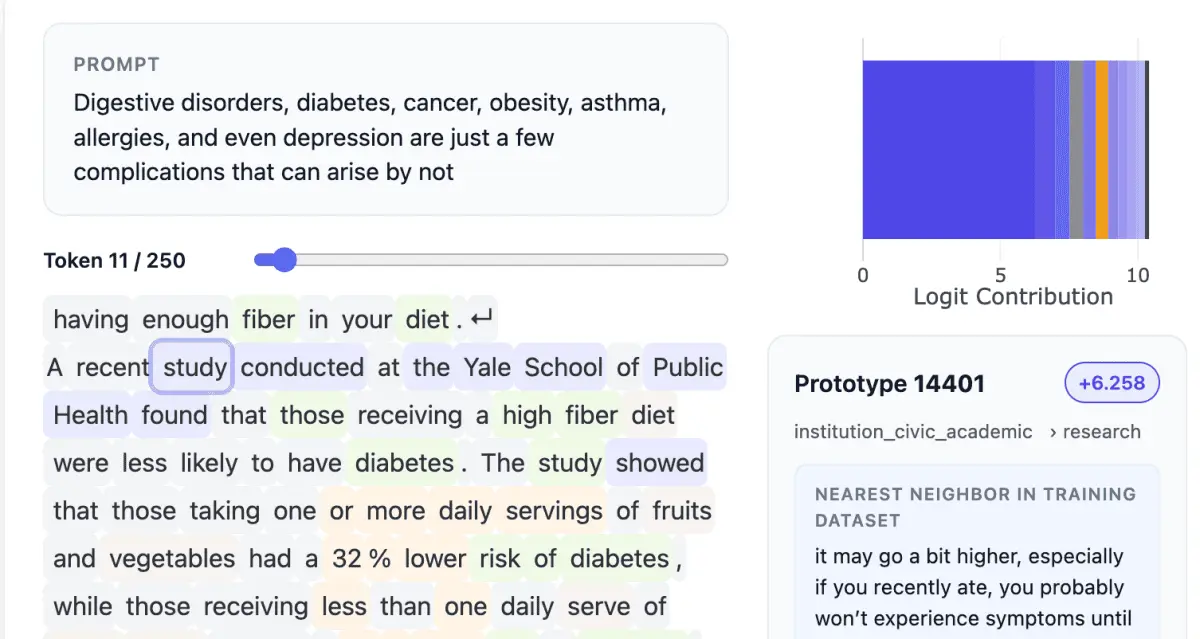AI Algorithm Enables Earlier Lung Cancer Detection in GP Consultations
2 Sources
2 Sources
[1]
AI tool helps GPs spot lung cancer risk months earlier
Amsterdam University Medical CenterApr 22 2025 GPs may soon be able to identify patients with an increased risk of lung cancer up to 4 months earlier than is currently the case. The GP should be able to simply identify patients during a consultation with an algorithm created by researchers at Amsterdam UMC based on the data of more than half a million patients. The results of the study were published today in the British Journal of General Practice. [doi-link: https://doi.org/10.3399/BJGP.2023.0489] The algorithm looks at all medical information from general practice including, the often for AI complicated, unstructured notes that a GP has made over the years. "The algorithm picks up predictive signals from patients' medical history. With this, the algorithm then identifies a large proportion of these patients up to 4 months earlier than is currently the case," says Martijn Schut, Professor of Translational Artificial Intelligence at Amsterdam UMC. Other studies and algorithms used predefined and coded variables, such as the variables 'smoking' or 'coughing up blood'. The GP's notes contain information about the history of the patients with which we can detect patients with cancer much earlier thanks to the algorithm." Ameen Abu Hanna, Professor of Clinical Information Science, Amsterdam UMC Further research must show which particular fragments the algorithm uses in order to actually be able to use it in practice. Other types of cancer This method may also offer relief for other types of cancer, which are often only found in an advanced stage, such as pancreatic, stomach or ovarian cancer. And for the patient, survival and quality of life are better and the costs are lower. "Now many patients are diagnosed with lung cancer in an advanced stage, 3 or 4, which means that 80% of patients often die within a year. Previous research indicates that receiving a diagnosis four weeks earlier already has a noticeable effect on the forecast. Four months is therefore probably a very relevant gain," adds Henk van Weert, emeritus professor of General Practice. Screening vs algorithm Compared to national screening programmes; the algorithm generates fewer false positives is lower and the selection can simply take place during the consultation. Lung cancer remains one of the most common cancers and, despite advances in treatment, still has a poor prognosis. The 5-year mortality rate is above 80%. Previous research indicated a significant increase in survival when treatment started 4 weeks earlier. With the authors' method, the majority (62%) of patients with lung cancer could be referred 4 months earlier. This makes a significant difference in costs. However, the method still needs to be validated in different countries and healthcare systems. Data The files of 525,526 patients were analyzed (from four academic GP networks in Amsterdam, Utrecht and Groningen), of which 2,386 were diagnosed with lung cancer. The diagnoses were validated using the Dutch Cancer Registry, and both structured and free text data were used to predict the diagnosis of lung cancer 5 months before diagnosis (4 months before referral). Amsterdam University Medical Center Journal reference: Schut, M. C., et al. (2025). Artificial intelligence for early detection of lung cancer in GPs' clinical notes: a retrospective observational cohort study. British Journal of General Practice. doi.org/10.3399/bjgp.2023.0489.
[2]
Detecting lung cancer four months earlier at the GP using AI
General practitioners (GPs) may soon be able to identify patients with an increased risk of lung cancer up to four months earlier than is currently the case. The GP should be able to simply identify patients during a consultation with an algorithm created by researchers at Amsterdam UMC based on the data of more than half a million patients. The results of the study were published in the British Journal of General Practice. The algorithm looks at all medical information from general practice, including the AI-complicated, unstructured notes that a GP has made over the years. "The algorithm picks up predictive signals from patients' medical history. With this, the algorithm then identifies a large proportion of these patients up to four months earlier than is currently the case," says Martijn Schut, Professor of Translational Artificial Intelligence at Amsterdam UMC. Other studies and algorithms used predefined and coded variables, such as the variables "smoking" or "coughing up blood." "The GP's notes contain information about the history of the patients with which we can detect patients with cancer much earlier thanks to the algorithm," says Ameen Abu Hanna, professor of Clinical Information Science at Amsterdam UMC. Further research must show which particular fragments the algorithm uses in order to actually be able to use it in practice. Other types of cancer This method may also offer relief for other types of cancer, which are often only found in an advanced stage, such as pancreatic, stomach or ovarian cancer. And for the patient, survival and quality of life are better and the costs are lower. "Now many patients are diagnosed with lung cancer at an advanced stage, 3 or 4, which means that 80% of patients often die within a year. Previous research indicates that receiving a diagnosis four weeks earlier already has a noticeable effect on the forecast. Four months is therefore probably a very relevant gain," adds Henk van Weert, emeritus professor of General Practice. Screening vs. algorithm Compared to national screening programs, the algorithm generates fewer false positives and the selection can simply take place during the consultation. Lung cancer remains one of the most common cancers and, despite advances in treatment, still has a poor prognosis. The five-year mortality rate is above 80%. Previous research indicated a significant increase in survival when treatment started four weeks earlier. With the authors' method, the majority (62%) of patients with lung cancer could be referred four months earlier. This makes a significant difference in costs. However, the method still needs to be validated in different countries and health care systems. The files of 525,526 patients were analyzed (from four academic GP networks in Amsterdam, Utrecht and Groningen), of which 2,386 were diagnosed with lung cancer. The diagnoses were validated using the Dutch Cancer Registry, and both structured and free text data were used to predict the diagnosis of lung cancer five months before diagnosis (four months before referral).
Share
Share
Copy Link
Researchers at Amsterdam UMC have developed an AI algorithm that can help GPs identify patients with increased lung cancer risk up to four months earlier than current methods, potentially improving survival rates and treatment outcomes.

AI-Powered Early Detection of Lung Cancer
Researchers at Amsterdam University Medical Center (UMC) have developed a groundbreaking AI algorithm that could revolutionize the early detection of lung cancer. This innovative tool enables general practitioners (GPs) to identify patients with an increased risk of lung cancer up to four months earlier than current methods
1
.How the Algorithm Works
The AI algorithm analyzes all medical information from general practice, including unstructured notes made by GPs over the years. Professor Martijn Schut of Amsterdam UMC explains, "The algorithm picks up predictive signals from patients' medical history. With this, the algorithm then identifies a large proportion of these patients up to 4 months earlier than is currently the case"
2
.Unlike previous studies that relied on predefined and coded variables such as "smoking" or "coughing up blood," this new approach leverages the wealth of information contained in GP notes. Professor Ameen Abu Hanna of Amsterdam UMC emphasizes, "The GP's notes contain information about the history of the patients with which we can detect patients with cancer much earlier thanks to the algorithm"
1
.Potential Impact on Patient Outcomes
The earlier detection of lung cancer could significantly improve patient outcomes. Emeritus Professor Henk van Weert notes, "Now many patients are diagnosed with lung cancer in an advanced stage, 3 or 4, which means that 80% of patients often die within a year. Previous research indicates that receiving a diagnosis four weeks earlier already has a noticeable effect on the forecast. Four months is therefore probably a very relevant gain"
1
.Advantages Over Current Screening Methods
Compared to national screening programs, the AI algorithm offers several advantages:
- Fewer false positives
- Simple integration into regular GP consultations
- Potential for earlier referrals for 62% of lung cancer patients
These benefits could lead to improved survival rates and reduced healthcare costs
2
.Related Stories
Study Details and Future Directions
The research, published in the British Journal of General Practice, analyzed the files of 525,526 patients from four academic GP networks in Amsterdam, Utrecht, and Groningen. Of these, 2,386 were diagnosed with lung cancer
1
2
.While the results are promising, further research is needed to identify which specific fragments the algorithm uses to make its predictions. Additionally, the method requires validation in different countries and healthcare systems before widespread implementation
1
.Potential Applications Beyond Lung Cancer
The researchers suggest that this AI-driven approach could also benefit the early detection of other cancers often found in advanced stages, such as pancreatic, stomach, or ovarian cancer. This could lead to improved survival rates, better quality of life for patients, and lower healthcare costs
2
.As AI continues to advance in healthcare, tools like this algorithm demonstrate the potential for technology to enhance medical decision-making and improve patient outcomes in critical areas such as cancer detection and treatment.
References
Summarized by
Navi
[1]
[2]
Related Stories
Recent Highlights
1
Google Gemini 3.1 Pro doubles reasoning score, beats rivals in key AI benchmarks
Technology

2
Pentagon Summons Anthropic CEO as $200M Contract Faces Supply Chain Risk Over AI Restrictions
Policy and Regulation

3
Canada Summons OpenAI Executives After ChatGPT User Became Mass Shooting Suspect
Policy and Regulation








